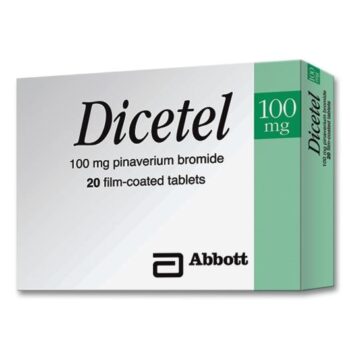DICETEL
$71.80 – $119.50Price range: $71.80 through $119.50
.
Dicetel: An In-Depth Overview.
Description;
Dicetel (dicyclomine hydrochloride) is a medication primarily used to treat irritable bowel syndrome (IBS) and other gastrointestinal disorders. It belongs to a class of drugs known as anticholinergics, which work by relaxing the muscles in the gut and reducing spasms. This article provides a comprehensive overview of dicyclomine hydrochloride, including its uses, dosage, side effects, interactions, and answers to common questions.
What is Dicetel?
Dicetel is an anticholinergic medication that helps alleviate symptoms associated with gastrointestinal disorders, particularly IBS. It works by blocking the action of acetylcholine, a neurotransmitter that can cause muscle contractions in the digestive tract. By inhibiting these contractions, dicyclomine hydrochloride helps to relieve abdominal pain, cramping, and discomfort associated with IBS.

Uses of Dicetel
dicyclomine hydrochloride is primarily prescribed for the treatment of irritable bowel syndrome (IBS). IBS is a common gastrointestinal disorder characterized by symptoms such as abdominal pain, bloating, gas, and altered bowel habits (diarrhea or constipation). In addition to IBS, dicyclomine hydrochloride may also be used to treat other conditions that involve muscle spasms in the gastrointestinal tract, such as diverticulitis and functional bowel disorders.
How Does Dicetel Work?
dicyclomine hydrochloride works by blocking the action of acetylcholine on smooth muscle in the gastrointestinal tract. This action reduces muscle contractions and spasms, leading to decreased abdominal pain and discomfort. By relaxing the muscles in the gut, dicyclomine hydrochloride helps to improve bowel function and alleviate symptoms associated with IBS.
Dosage and Administration
The dosage of dicyclomine hydrochloride varies depending on the individual’s condition and response to treatment. The typical starting dose for adults is 20 mg taken three times a day. If necessary, the dose may be increased to a maximum of 40 mg three times a day. It is important to follow the prescribing physician’s instructions and not exceed the recommended dosage.
Side Effects of Dicetel
Like all medications, dicyclomine hydrochloride can cause side effects. Common side effects include:
– Dry Mouth: A common anticholinergic effect, leading to discomfort.
– Dizziness: Some users may experience lightheadedness or dizziness.
– constipation: As a result of reduced gastrointestinal motility.
– Nausea: Some individuals may feel nauseous after taking dicyclomine hydrochloride.
Serious side effects are rare but can include allergic reactions, difficulty urinating, and severe dizziness. If any severe side effects occur, it is crucial to seek medical attention immediately.
Drug Interactions
dicyclomine hydrochloride can interact with other medications, which may increase the risk of side effects or reduce the effectiveness of treatment. Some notable interactions include:
– Other Anticholinergics: Using dicyclomine hydrochloride with other anticholinergic medications can enhance side effects.
– Antidepressants: Certain antidepressants may increase the risk of side effects when taken with dicyclomine hydrochloride.
– Antihistamines: Some antihistamines can also have anticholinergic effects, leading to increased sedation and dry mouth.
Patients should inform their healthcare provider about all medications they are taking to avoid potential interactions.
Precautions and Warnings
Before starting dicyclomine, patients should discuss their medical history with their healthcare provider. Important considerations include:
– Glaucoma: dicyclomine hydrochloride may increase intraocular pressure, worsening glaucoma.
– Urinary Retention: Patients with a history of urinary retention should use dicyclomine hydrochloride cautiously.
– Pregnancy and Breastfeeding: The safety of dicyclomine hydrochloride during pregnancy and breastfeeding has not been fully established. Patients should consult their healthcare provider if they are pregnant or planning to become pregnant.

Common Questions About Dicetel
1. What is Dicetel used for?
dicyclomine hydrochloride is primarily used to treat irritable bowel syndrome (IBS) and other gastrointestinal disorders characterized by muscle spasms.
2. How does dicyclomine work?
dicyclomine hydrochloride works by blocking acetylcholine, which reduces muscle contractions in the gastrointestinal tract, alleviating symptoms like abdominal pain and cramping.
3. What are the side effects of Dicetel?
Common side effects include dry mouth, dizziness, constipation, and nausea. Serious side effects are rare but can occur.
4. Can Dicetel interact with other medications?
Yes, dicyclomine hydrochloride can interact with other medications, particularly other anticholinergics, antidepressants, and antihistamines.
5. Is dicyclomine hydrochloride safe during pregnancy?
The safety of dicyclomine during pregnancy has not been fully established, so it is essential to consult a healthcare provider.
Conclusion
dicyclomine hydrochloride is a valuable medication for managing symptoms of irritable bowel syndrome and other gastrointestinal disorders. By understanding its uses, dosage, side effects, and potential interactions, patients can make informed decisions about their treatment options. As with any medication, it is crucial to follow the guidance of a healthcare provider to ensure safe and effective use.
| Qty | 50mg, 100 tabs, 100mg, 100 tabs |
|---|



Reviews
There are no reviews yet.